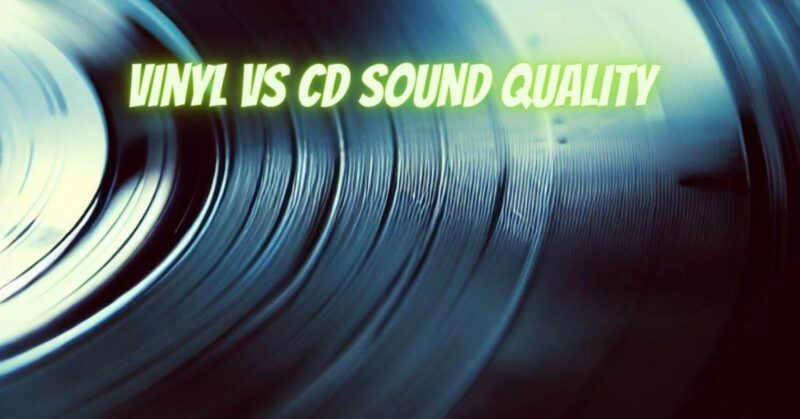The debate between vinyl records and CDs (Compact Discs) has been a long-standing topic of discussion among audiophiles and music enthusiasts. Both formats have their unique characteristics and sound qualities, appealing to different preferences and listening experiences. In this article, we will analyze the sound quality differences between vinyl records and CDs, exploring the factors that contribute to their distinct sonic signatures.
Vinyl Records: Sound Quality and Advantages
- Analog Sound: Vinyl records are an analog format, meaning the sound is stored and reproduced as continuous waves rather than the digital 0s and 1s of CDs. Some audiophiles argue that analog sound offers a warmer, more organic, and “authentic” listening experience compared to the digital sound of CDs.
- Dynamic Range: Vinyl records can have a wider dynamic range, allowing for more subtle variations in volume and greater detail in the music. This can result in a more immersive and dynamic listening experience, especially with well-mastered recordings.
- Physical Grooves: The physical grooves on vinyl records hold the music’s information, and the mechanical process of the needle tracking through these grooves can create a unique and nostalgic sound quality that some listeners find appealing.
- Artistic Value: Many collectors and enthusiasts appreciate the tangible and artistic value of vinyl records, with their large album artwork and unique packaging contributing to the overall listening experience.
Compact Discs (CDs): Sound Quality and Advantages
- Digital Clarity: CDs store audio in a digital format, which provides accurate and precise sound reproduction. The digital nature of CDs eliminates issues like vinyl record surface noise, pops, and clicks, resulting in a cleaner and more transparent sound.
- Low Noise: CDs have a lower noise floor compared to vinyl records, as they are not susceptible to the background noise and imperfections inherent in analog formats.
- Consistency: CDs offer consistent sound quality and playback. As long as the disc is in good condition, the sound will remain the same with every play, unlike vinyl records that can wear out over time and affect sound quality.
- Convenience: CDs are convenient to handle, store, and transport. They are more durable than vinyl records and do not require careful handling or special cleaning procedures.
Analyzing Sound Quality Differences
The sound quality differences between vinyl records and CDs can be subjective and influenced by various factors:
- Equipment: The quality of the playback equipment, including turntables or CD players, speakers, and amplifiers, significantly impacts the sound quality of both formats.
- Mastering and Pressing: The mastering and pressing process of vinyl records and CDs can also affect sound quality. Well-mastered and well-pressed records and CDs are more likely to provide superior sound reproduction.
- Listener Preference: Listener preferences play a crucial role in determining which format sounds better to an individual. Some may prefer the warm and analog sound of vinyl records, while others may favor the digital clarity of CDs.
The sound quality differences between vinyl records and CDs are nuanced and influenced by individual preferences, equipment, and recording quality. Vinyl records offer a nostalgic and analog listening experience, with unique sonic characteristics appreciated by many audiophiles and collectors. On the other hand, CDs provide digital clarity and consistency, with low noise and accurate sound reproduction.
Ultimately, the choice between vinyl records and CDs comes down to personal preference and the listening experience that resonates with each individual. Both formats have their place in the world of music, contributing to the diverse and rich landscape of audio consumption for music enthusiasts worldwide.


